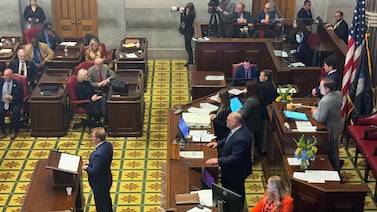When Royce Griffin weighed his college options two years ago, scholarship offers played a big part in his decision.
Griffin, who is Black and hails from Jackson, Mississippi, chose the University of Missouri in large part because it offered him a scholarship that covered more than $20,000 a year in out-of-state tuition costs. Known as the Diversity Award, it’s a scholarship given to high-achieving students from racial or ethnic backgrounds that are underrepresented at the university.
But last month, after Missouri Attorney General Andrew Bailey wrote in a letter that colleges there had to adopt race-blind criteria for scholarships following the Supreme Court’s ruling striking down affirmative action, the university announced it would not offer scholarships like the Diversity Award to future applicants. When Griffin found out about that decision, he worried it could limit opportunities for students of color.
“It’s a really important scholarship for us,” said Griffin, a rising junior studying in the university’s top-rated journalism program. Without that aid, he said, he couldn’t have afforded to go to college outside of Mississippi: “It puts us on that same playing field as our white counterparts.”
The text of the Supreme Court’s ruling, released last month, is limited to college admissions and says nothing directly about scholarships. But some state officials and college leaders have interpreted the decision to include scholarships that consider a student’s race, too — a view some legal experts say could hold up in court.
Officials with organizations that represent financial aid administrators and diversity officers in higher education are cautioning colleges to take their time in deciding whether the ruling applies to scholarships, and to wait for forthcoming guidance from the federal government. That guidance, slated to be released by mid-August, is expected to outline which admissions practices and student programs remain lawful in the Biden administration’s view.
Meanwhile, there’s uncertainty and confusion as many high schoolers gear up to apply to colleges and scholarships this fall and counselors try to help them figure out their options.
“Programs like that — they benefit our students all the time,” said Vanessa Lee, a Chicago teacher who spent the last eight years advising students on their postsecondary options at Back of the Yards College Prep, a high school that serves mostly Latino students from low-income families.
One state university comes to the high school to recruit aspiring Latino engineers, she said, while another local university recently gave a student a scholarship for Black women pursuing careers in fields like science and math. If programs like those went away, Lee said, “our students would not have as many opportunities.”
Scholarships that consider race are in limbo
So far, the number of colleges that have announced concrete changes to their scholarship offerings has been small, though some legal experts and college officials expect more to follow.
In states that previously banned affirmative action, college administrators and attorneys often interpreted state law more broadly to include financial aid, noted Wil Del Pilar, the senior vice president at The Education Trust, an education civil rights group.
“There was this kind of chilling effect on using race as institutional administrators, one, were afraid of political backlash, and second, they were afraid of legal action,” he said. “We’re really watching that.”
Already, the University of Missouri system, which includes the flagship university commonly known as Mizzou and three other universities, has said it would no longer offer scholarships that take a student’s race or ethnicity into consideration, though it will honor awards it gave previously to incoming and existing students, like Griffin. The Diversity Award, for example, is no longer listed on Mizzou’s scholarships page.
The university system has notified 1,600 students that their previously awarded scholarships or grants that had racial requirements or preferences would be upheld, wrote Christian Basi, a spokesperson for the system, in an email to Chalkbeat.
Griffin was relieved to find out his own scholarship was safe. But he saw the university’s quick move to end race-conscious scholarships, while other Missouri colleges took time to deliberate as another example of how the university was failing to support Black students like him. Already, he said, some students have shared on social media that the decision made them feel less welcome and more like “Mizzou might not be the place for them.”
In an email, Basi said the university system made a speedy announcement because “we knew we would be getting questions and calls from students and parents immediately following the ruling” and officials wanted to let incoming students know their financial aid wouldn’t change “as quickly as possible.”
The university system’s statement about the scholarship changes, he added, “specifically talked about how ‘contributions from individuals with diverse backgrounds, experiences and perspectives….’ lead to making our university a ‘better place to work, learn and innovate.’”
The University of Kentucky, meanwhile, has yet to notify students that it will honor previously awarded scholarships that took race into account, after the university’s president said it appeared that the Supreme Court’s affirmative action ruling applied to both admissions and scholarships.
“We are discussing that process and how best to do that in the near future,” Jay Blanton, a spokesperson for the university, wrote in an email to Chalkbeat. Officials are reviewing whether to make changes to scholarship programs going forward.
For now, the university’s diversity scholarship is still listed on its website.
End of scholarships, even small ones, could derail students
Given the current political climate — with ongoing efforts to ban diversity, equity, and inclusion initiatives in colleges and schools, and new laws restricting what schools can teach about race and gender — Del Pilar said there could be “a slew of bills” that target the use of race in colleges beyond admissions.
Two years ago, a conservative law firm sued the Wisconsin agency that oversees the state’s financial aid system, arguing the grants it offered to Black, Native American, Hispanic, and some Southeast Asian students were discriminatory and unconstitutional. That case was dismissed last year. But the president of the law firm that filed the lawsuit, Rick Esenberg, has said he thinks the Supreme Court’s latest ruling would bolster their argument.
“It’s very difficult to see how the state wins that case now,” Esenberg told Inside Higher Ed.
The Republican speaker of Wisconsin’s state assembly, Robin Vos, has said he plans to introduce a bill this fall “to correct the discriminatory laws” that created those grants in 1985.
For now, private scholarships that consider race and ethnicity haven’t faced the same kind of pushback. The University of Missouri system, for example, said it will continue to accept scholarships from private organizations that consider a student’s race — so long as the university was not involved in the selection process.
Angelique Albert, the CEO of Native Forward, a nonprofit that awards private scholarships to Native students, said her organization has been reassuring donors in the wake of the Supreme Court’s ruling that their donations will still reach Native students.
Her organization has also been reaching out to colleges to make sure they’re aware that their scholarships are based on tribal citizenship, not race.
Still, she is worried about what will happen if students lose access to scholarships that consider their Native identity.
“The need is so high,” Albert said. “As Native people in this country, we have not had generational access to education, we haven’t had generational wealth.”
Corri Tate Ravare, the executive director of a charter school in central New Jersey that’s part of the College Achieve Public Schools network, said for her students, even smaller scholarships of $500 to $1,000 that consider race or ethnicity can be the difference between a student being able to attend a college, or not. Many of the students at her school are of Puerto Rican or Dominican descent.
Scholarships often cover tuition, she said, but families still need help paying for housing costs or fees for things like on-campus health care.
If her staff sees colleges getting rid of certain scholarships, she said, they’ll likely start preparing students to apply for private scholarships earlier in their high school career.
“We don’t want any student to not go to their college of choice because of a small financial gap,” Ravare said. “We just sort of have to wait and see.”
Kalyn Belsha is a national education reporter based in Chicago. Contact her at kbelsha@chalkbeat.org.







